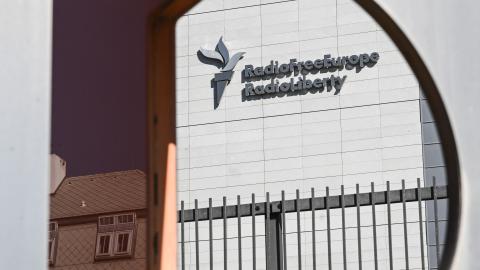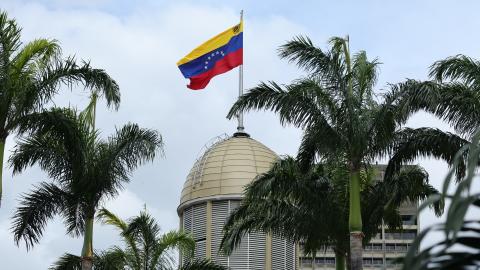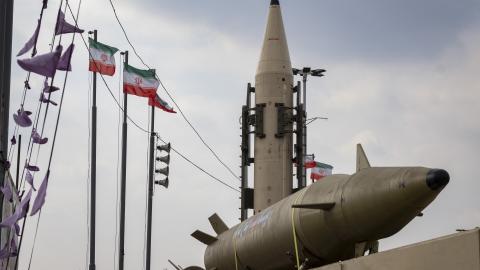Iraq's out-of-country voting program began yesterday but the pro-democracy Iraqi American Christians, rather than being elated by the opportunity to vote in the first Iraqi election in decades, are enraged by what they see as ethnic discrimination against them in the process here in the United States and are debating whether to boycott it. The story behind this travesty is familiar to independent observers of U.S. Iraq policy: It reflects the U.S. government's favoritism of Iraq's Kurdish minority, and its indifference to the fate of the Christian one, overlaid with the intransigence of an international bureaucracy. This is devastating to a religious minority that is taking the brunt of terrorism and persecution within Iraq with the kidnapping of its beloved Archbishop Basile Georges Casmoussa outside his church in Mosul Monday as the latest example (he's since been released).
The problem stems from the decision of the International Organization of Migration (IOM), the intergovernmental body contracted to carry out the operation, to limit polling places in the United States to five with only one of these located west of the Mississippi, in Los Angeles. This decision was made with input and data on census and immigration from the U.S. government—according to reports that quoted Steve Lennon an IOM officer in Washington, D.C.—and is being carried out with U.S. funding. The United States is a founding member of the IOM.
With absentee balloting not an option in the Iraqi vote, this means that tens of thousands of Iraqi Americans in areas distant from Los Angeles are effectively disenfranchised. The 40,000 or so eligible voters who reside in California's Central Valley around Modesto and in the north would have to drive 1,800 miles within the next two weeks in order first to register to vote and again to actually cast ballots. San Diego, the third-largest area of Iraqi settlement in the country after Detroit and Michigan and home to another estimated 25,000 eligible Iraqi voters, has also been passed over as a polling site. It so happens that those in the affected areas are mainly ChaldoAssyrians, all of whom are Christian.
Contrast these numbers with the IOM's polling site in Nashville, which is expected to serve a mere 3,000 voters, mostly Kurds. This is a sore point for the ChaldoAssyrians, who perceive U.S. favoritism of the Kurds in the disbursement of American reconstruction aid in northern Iraq as well. Though discrimination against the ChaldoAssyrians in the U.S. is probably not intentional, the effect is the same: Thousands of them will not be able to vote in a pivotal election for a constituent assembly to draft the permanent constitution and shape the next government of Iraq.
The American ChaldoAssyrian community was at first energized by the news that came in December announcing that those in the diaspora would be eligible to vote in Iraq's first free election in 66 years. Activists such as Joseph Kassab, president of the Michigan-based Chaldean National Congress, immediately set about getting out voter-education materials on the Internet. But hope gave way to anger when the polling locations themselves were finally confirmed on January 14. It has prompted appeals to the IOM from the Chaldean bishop in California, lawyers for the national ChaldoAssyrian Advocacy Council, and a delegation of California members of Congress. Congressman Frank Wolf, chair of the House subcommittee for the State Department's appropriations, raised the issue in a letter to Secretary Powell. The Los Angeles Times, the Washington Times, and other press reported on it.
The IOM out-of-country voting director in the U.S., Roger Bryant, has been unmoved by the grassroots petitions, and stubbornly refuses to add polling sites in Modesto and San Diego. And despite the protest campaign, when questioned about the impending disenfranchisement of tens of thousands of California ChaldoAssyrians at the daily press briefing last Friday, State Department Spokesman Richard Boucher refused to comment other than to say he was unaware of the issue.
The voting process extends over two weeks, with registration having started yesterday and extending until January 23; voting is to occur between January 28 and 30. The out-of-country voting has been a hasty, last-minute arrangement that got underway only last month. It is not true, as some U.S. officials have told me, that polling sites are limited to five per country—in fact, the IOM's website shows that Iran, a country one-sixth the size of the United States, has been allotted polling sites in six cities (also funded by the United States). An advantage of Iraq's slate balloting system, which will preclude later voting for the insecure areas, is that it allows out-of-country voting. In adopting this voting system the Coalition Provisional Authority decided the advantages outweighed the drawbacks. It would seem important, then, to accommodate as many eligible out-of-country voters as possible, even if it entails a little more effort by the IOM. Why has it become "impossible" to set up two more polling booths in California and allow Iraqi Americans who live at a distance to register and vote at the same time?
On top of the harsh persecution that is driving out the Christians from Iraq (due to perceptions by Islamist terrorists that they are pro-American), large numbers of this pro-democracy, pro-human-rights minority are now being needlessly disenfranchised from the Iraqi election within the United States. As Congressman George Radanovich, Republican of California's Central Valley, asked in his protest last week: "Isn't it ironic that we are asking our soldiers to risk their lives to enable these elections to occur and yet we are not providing sufficient numbers of voting booths for the Iraqis in this country who will be casting their ballot for the first time?" Ironic, indeed.














